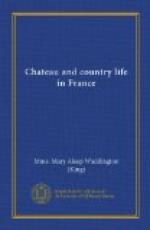[Illustration: Peasant women.]
V
CEREMONIES AND FESTIVALS
We were very particular about attending all important ceremonies at La Ferte, as we rarely went to church there except on great occasions. We had our service regularly at the chateau every Sunday morning. All the servants, except ours, were Protestants, Swiss generally, and very respectable they looked—all the women in black dresses and white caps—when they assembled in M. A.’s library, sitting on cane chairs near the door.
Some, in fact most, Protestants in France attach enormous importance to having all their household Protestant. A friend of mine, a Protestant, having tea with me one day in Paris was rather pleased with the bread or little “croissants,” and asked me where they came from. I said I didn’t know, but would ask the butler. That rather surprised her. Then she said, “Your baker of course is a Protestant.” That I didn’t know either, and, what was much worse in her eyes, I didn’t care. She was quite distressed, gave me the address of an excellent Swiss Protestant baker and begged me to sever all connection with the Catholic at once. I asked her if she really thought dangerous papist ideas were kneaded in with the bread, but she would not listen to my mild “persiflage,” and went away rather anxious about my spiritual welfare.
We went always to the church at La Ferte for the fete of St. Cecile, as the Fanfare played in the church on that day. The Fanfare was a very important body. Nearly all the prominent citizens of La Ferte, who had any idea of music, were members—the butcher, the baker, the coiffeur, etc. The Mayor was president and walked at the head of the procession when they filed into the church. I was “Presidente d’Honneur” and always wore my badge pinned conspicuously on my coat. It was a great day for the little town. Weeks before the fete we used




